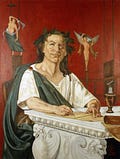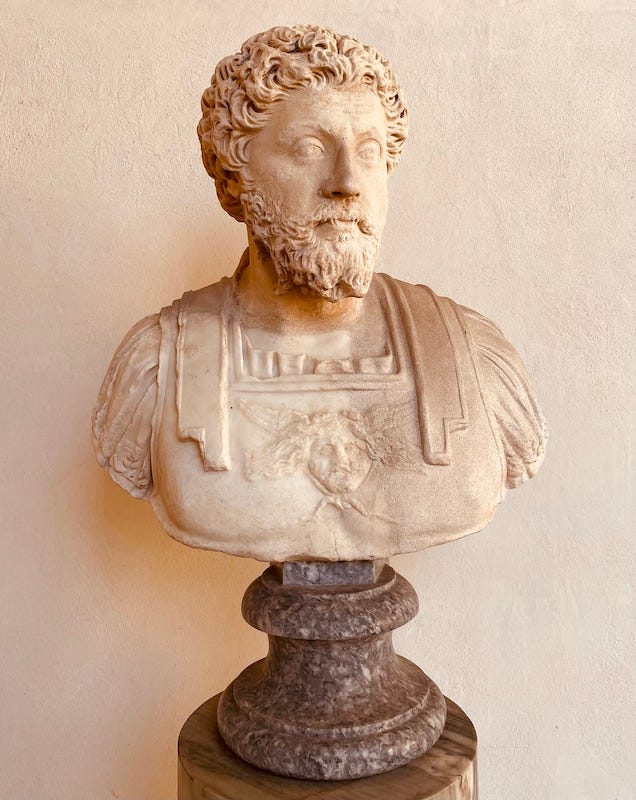Philosophy as a Way of Life—IV—Only the present is our happiness
Live hic et nunc, here and now
[Check out parts I, II, and III in this series. This is the last entry.]
Johann Wolfgang von Goethe once wrote a letter to his long-time correspondent, the composer Carl Friedrich Zelter, to lament our inability to live in the present moment, to grasp its essential healthiness. The Greco-Romans, says Goethe, understood that the present is pregnant with meaning, and to them it was sufficient in itself. By contrast, Goethe continues, for us moderns the ideal is the future, while we consider the present to be banal.
“Then the spirit looks neither ahead nor behind. Only the present is our happiness.” (Second Faust)
Pierre Hadot—in his Philosophy as a Way of Life—reminds us of Goethe’s analysis, adding that the ancients articulated the concept of kairos, the favorable or decisive instant. To be able to grasp the kairos is the key to our accomplishments. For instance, a good general strikes when the kairos is right; a good artist fixes in marble or on canvas the best kairos of whatever scene she is working on; and so forth.
But Hadot also warns against idealizing the Greco-Romas, thinking that they somehow managed to live a life of bliss and lack of stress. On the contrary, they were just as burdened by the past and preoccupied for the future as we are. And that’s exactly what prompted the evolution of life philosophies like Stoicism and Epicureanism. In fact. to “convert” to a philosophical way of life means, to a great extent, to develop a renewed appreciation for the healthiness of the moment as a way to achieve serenity.
Both Epicureanism and Stoicism—otherwise so different from each other—insist on the crucial importance of the present and teach us not to worry about either the past or the future. One way they do that is by reminding us of the cosmic perspective, compared to which the span of a human existence is negligible. Adopting the view from above, there is no meaningful difference between the various moments of our lives. But our agency is effective only in the present. We can’t change the past, and we can’t control the future.
Hadot tackles first Epicureanism, reminding us that it is a philosophy conceived of as a therapy of anguish, whose goal is ataraxia, or peace of mind. The Epicureans train themselves not to worry about the gods, who are unconcerned about human affairs; or about death, since whenever she is we are not; or about satisfying desires that are unnatural and outsized, and which therefore are a cause of constant stress; or, finally, about being overly concerned with virtue, since we are imperfect beings bound to fail.
“According to Epicureanism, senseless people—that is, the majority of mankind—are tormented by vast, hollow desires which have to do with wealth, glory, power, and the unbridled pleasures of the flesh. What is characteristic of all these desires is that they cannot be satisfied in the present.” (p. 223)
The Epicurean solution is to reconceive pleasure so that it doesn’t depend on quantity or duration. The focus is, rather, on natural pleasures that are satisfied easily in the moment: quenching one’s thirst, taking care of one’s hunger, appreciating one’s friends.
“While we are talking, jealous time has fled. So seize the day [carpe diem], and put no trust in tomorrow.” (Horace, Odes, I.11.7)
This famous verse by Horace is often misinterpreted as being about instant gratification of sensual pleasures, just like Epicureanism itself is often misunderstood to be the sex, drugs, and rock ’n’ roll of ancient philosophy. But in fact, carpe diem is an invitation to philosophical conversion, to become aware of the vanity of desires that cannot easily be fulfilled, of our mortality, of the uniqueness and brevity of our lives. Hence the focus on the supreme importance of the current instant, for which we ought to be grateful.
The Stoic approach, while in certain respects definitely distinct from the Epicurean, amounts to a similar emphasis on the present. We are encouraged to pay attention to the here and now, hic et nunc as the Romans put it. We need to be constantly vigilant, focused on the current moment so that we don’t miss what’s going on in our own life. This attitude is nicely summarized by Marcus Aurelius:
“Here is what is enough for you:
1. The judgment you are bringing to bear at this moment upon reality, as long as it is objective;
2. The action you are carrying out at this moment, as long as it is accomplished in the service of the human community; and
3. The inner disposition in which you find yourself at this moment, as long as it is a disposition of joy in the face of the conjunction of events caused by extraneous causality.” (Meditations, IX.6)
Marcus engages in a spiritual exercise that he calls “delimiting the present.” It is based on a dual Stoic treatment of time. According to Stoic physics, time is infinitely divisible, which means that, technically speaking, the present does not exist, as it is defined as the limit between past and future. To this metaphysically abstract notion of time, however, the Stoics added another one that is human-centered and consciousness-dependent. In this second case, the present acquires what Hadot calls “a certain thickness,” delimited by the attention span of human consciousness. When Marcus says that we should delimit the present and stick to it, what he deploys is this second Stoic conception of time.
The exercise, then, consists in focusing on the present, leaving the past behind, entrusting the future to the cosmic web of cause-effect, and making sure that we are acting, right now, as a decent human being would. The rest will come or not, as the universes disposes of things. We find something similar also in Seneca:
“Two things must be cut short: the fear of the future and the memory of past discomfort; the one does not concern me any more, and the other does not concern me yet.” (Letters to Lucilius, XVIII.14)
Hadot summarizes the attitude by saying that happiness is a matter of now or never. If we are not happy now, by focusing on what is up to us—that is, our character, virtue, and judgment—then we’ll never be happy, regardless of how many material possessions and how much fame (both not up to us) we might accumulate. Moreover, there is a sense of urgency, because death approaches, and we have no idea when it will come. As Epictetus puts it:
“Keep in mind that now is the contest, and here right now are the Olympic games, and that postponement is no longer an option, and that your progress is saved or ruined by a single day and a single action.” (Encheiridion, 51)
You want to be a good person? Just be one, without delay. What are you waiting for? What better moment might there be? How many moments do you know for certain you will have? Marcus Aurelius says repeatedly (Meditations, II.5.2, VII.69) that we should get into the habit of living our lives as if today were the last day. Because it could be. And because if it isn’t, then we’ve used every moment of this day in the best way possible. Nothing focuses our attention as the awareness that time is running out.
This may actually sound stressful, but the Stoic constantly resituates herself within the cosmic perspective, putting her life, troubles, and accomplishments in the context of vast space and time. If she is truly able to do this, then her anxieties will disappear because she will be able to perceive things from the point of view of universal reason, which tells us that we simply have to do our best while we can and that nothing else is up to us. Rightly, I think, Hadot says:
“One could speak here of a mystical dimension of Stoicism. At each moment and every instant, we must say ‘yes’ to the universe; that is, to the will of universal reason. We must want that which universal reason wants: that is, the present instant, exactly as it is.” (p. 230)
This congruence of Epicureanism and Stoicism when it comes to living life in the moment is remarkable. The difference between the two schools here is one of attitude: the Epicurean’s goal is to enjoy the present moment, while the Stoic’s goal is to align her will with that moment. Pleasure vs duty, if you wish. Is it possible to combine the two? Hadot claims that such a hybrid was exactly what Goethe practiced, enjoying the present moment like an Epicurean, willing it intensely like a Stoic.
It is important to note, however, that living in the moment does not mean ignoring either past or future. The idea is not to let our thoughts be dominated by regret for the past or anxiety for the future. We still wish to learn from our past experiences and plan for our future. But the best way to do the former is to use the present as context (what, about my past, is pertinent to me, now?), and the best way to do the latter is to exercise good judgment now.
This is what Socrates meant when he said that we ought to take good care of ourselves. And this is what our consumerist society gets in the way of doing, with its constant distractions and artificial worries about both past and especially the future. Let us instead go back to the true meaning of carpe diem, to the essential healthiness of the present moment.





🙏
The irony is there is no such thing as the past or the future it is always a concept in our head. In fact, there has never been a past nor a future
that actually exists -- it is just this moment shimmering in eternity forevermore. That doesn’t mean that the concepts of past or future aren’t useful -- because without them we might become like idiots unable to see patterns repeating themselves and tying ourselves in knots since we were unable to plan for the future nor learn from the past. On closer scrutiny we never leave the present moment even has we reflect on the past and imagine a future, we are always doing that in the “present”. We can’t really stop ourselves from pondering both past and future and their is nothing wrong with that provided that we are aware of living “immediately” as we extract the wisdom from past mistakes and plan for a future that enhances our well being as a means to accessing the presence of now.